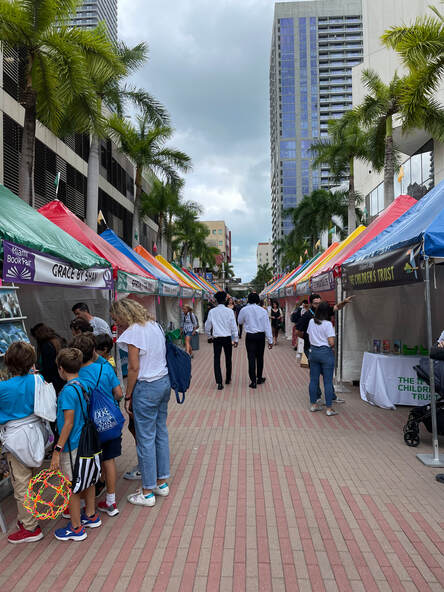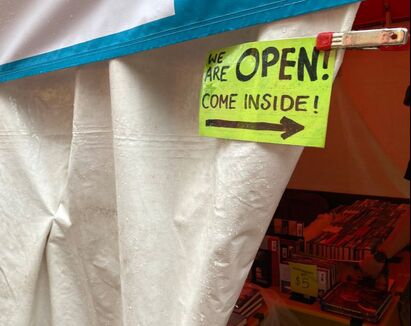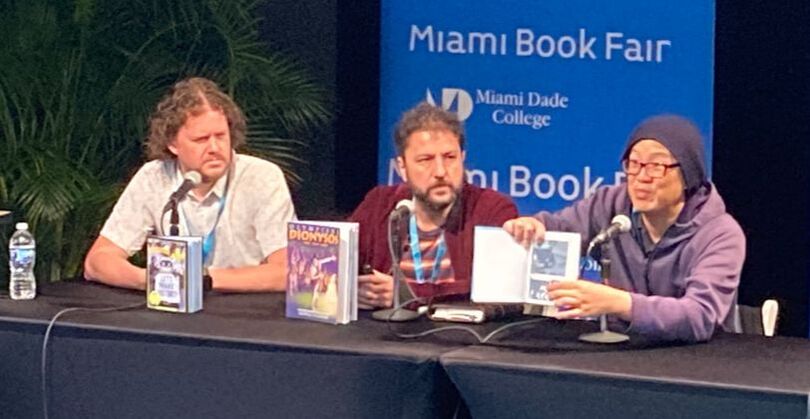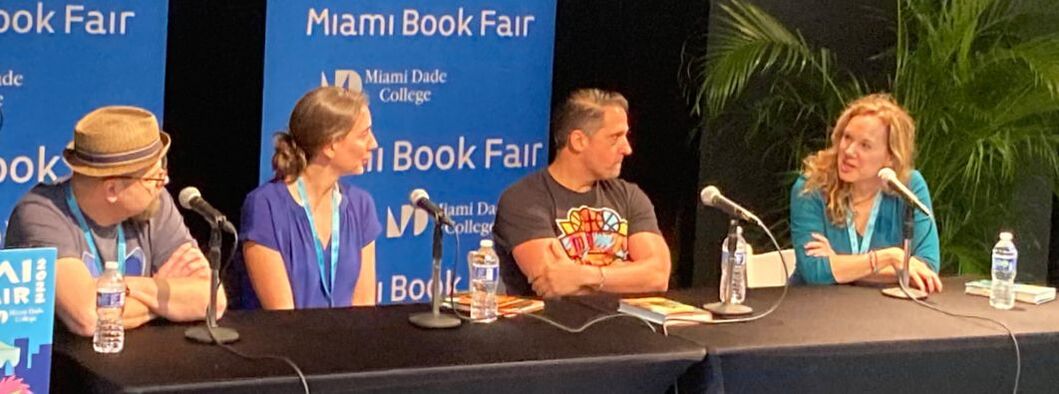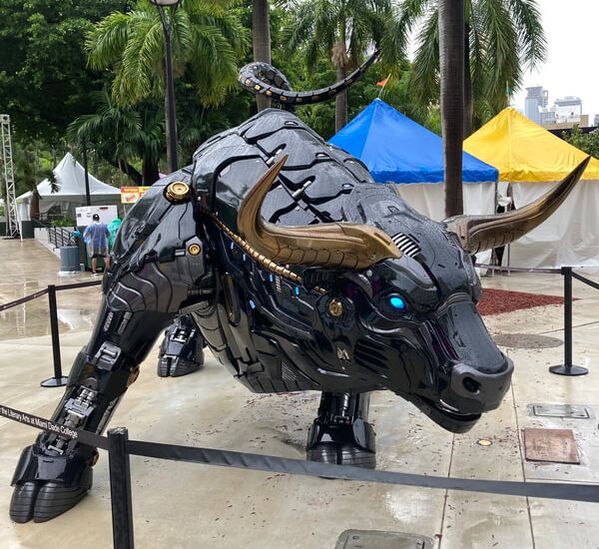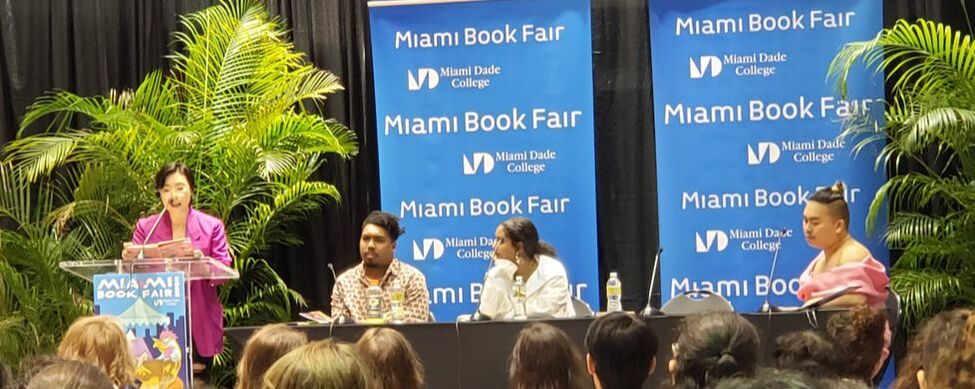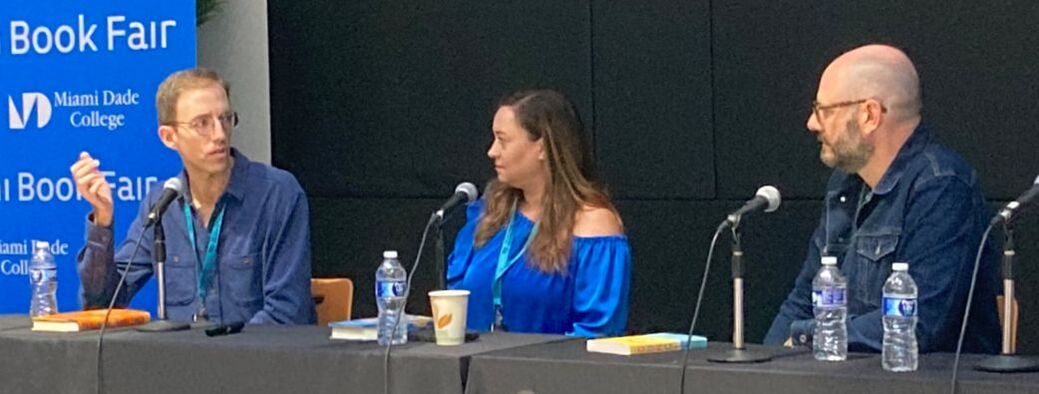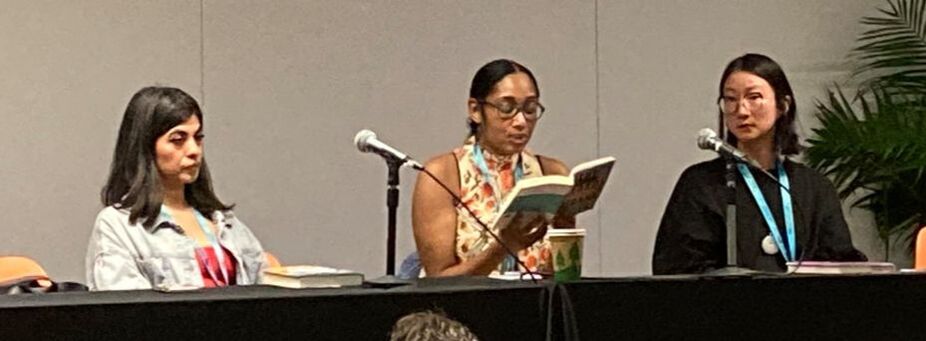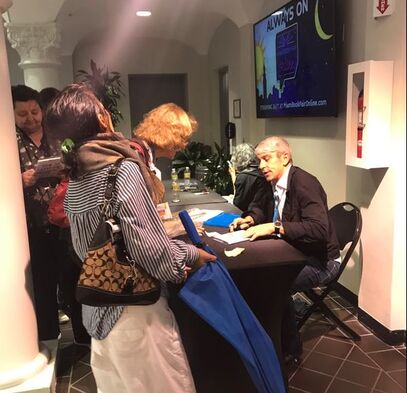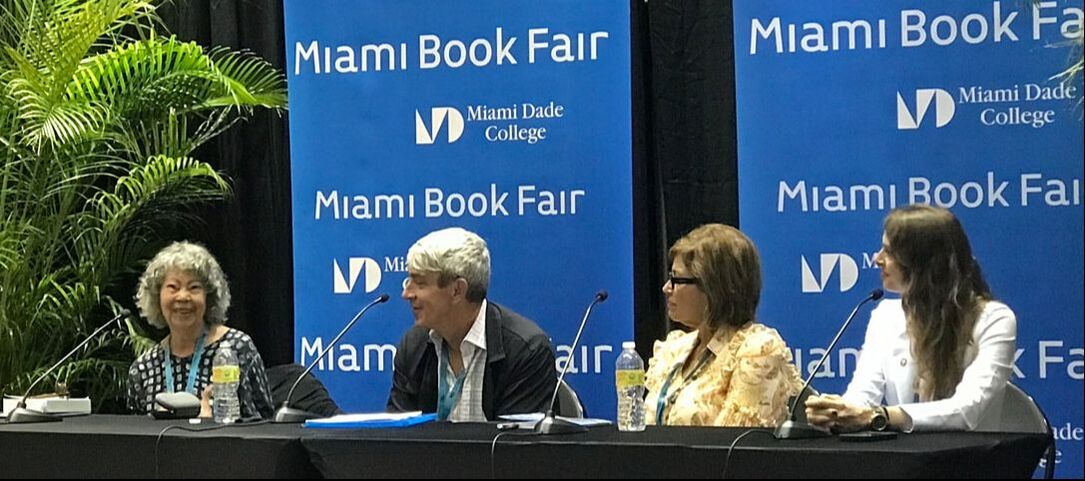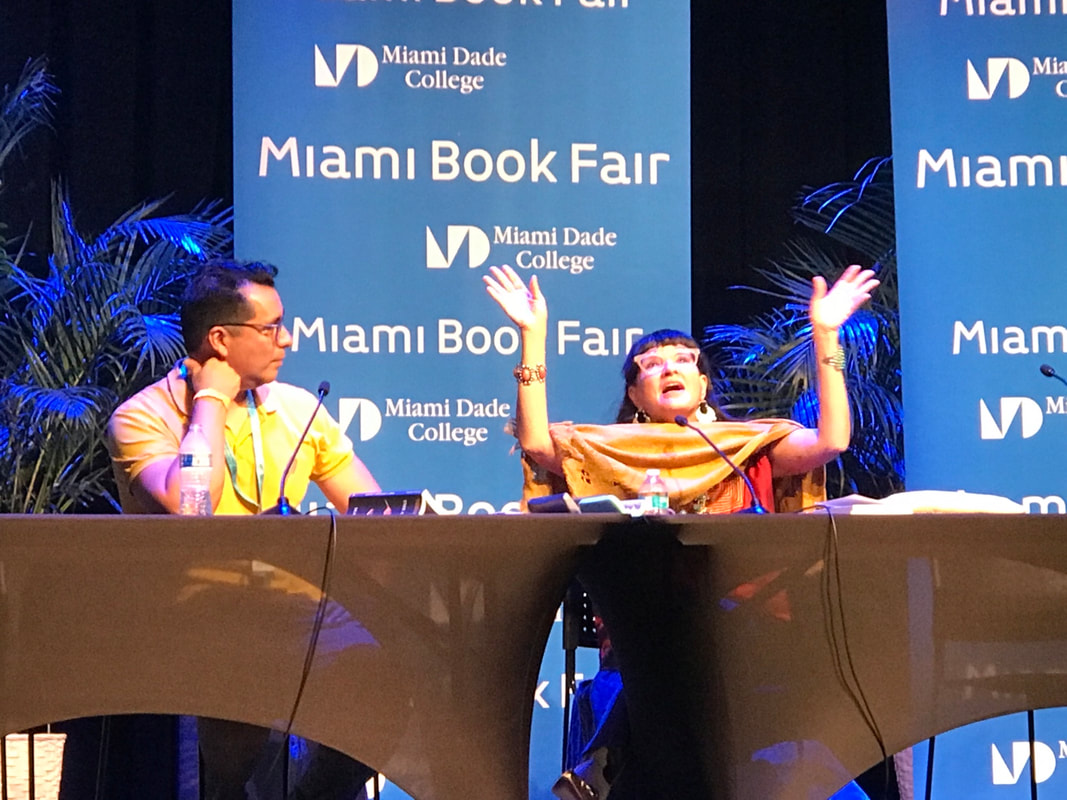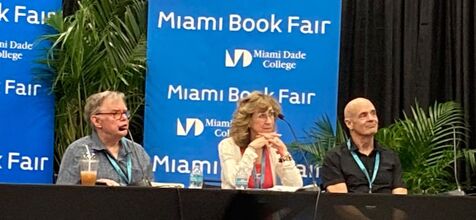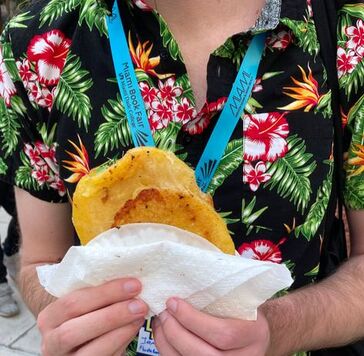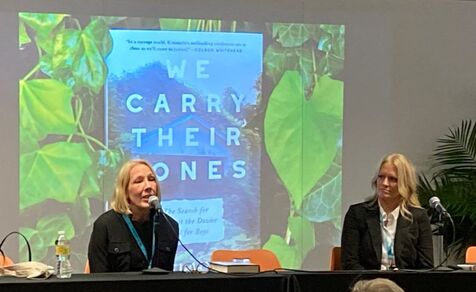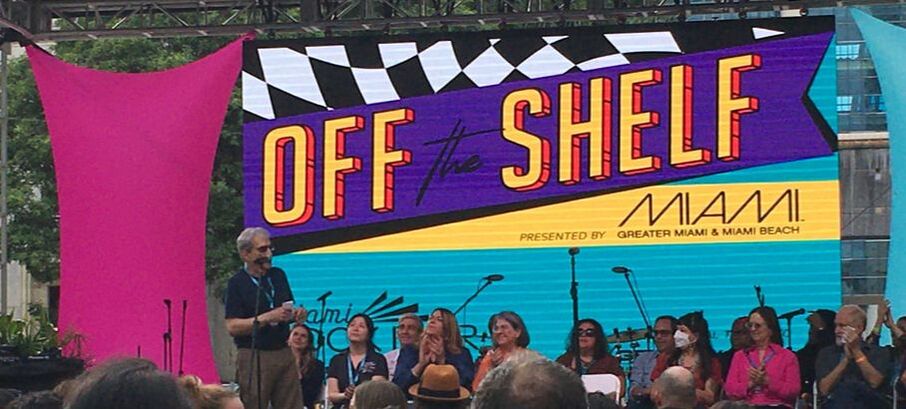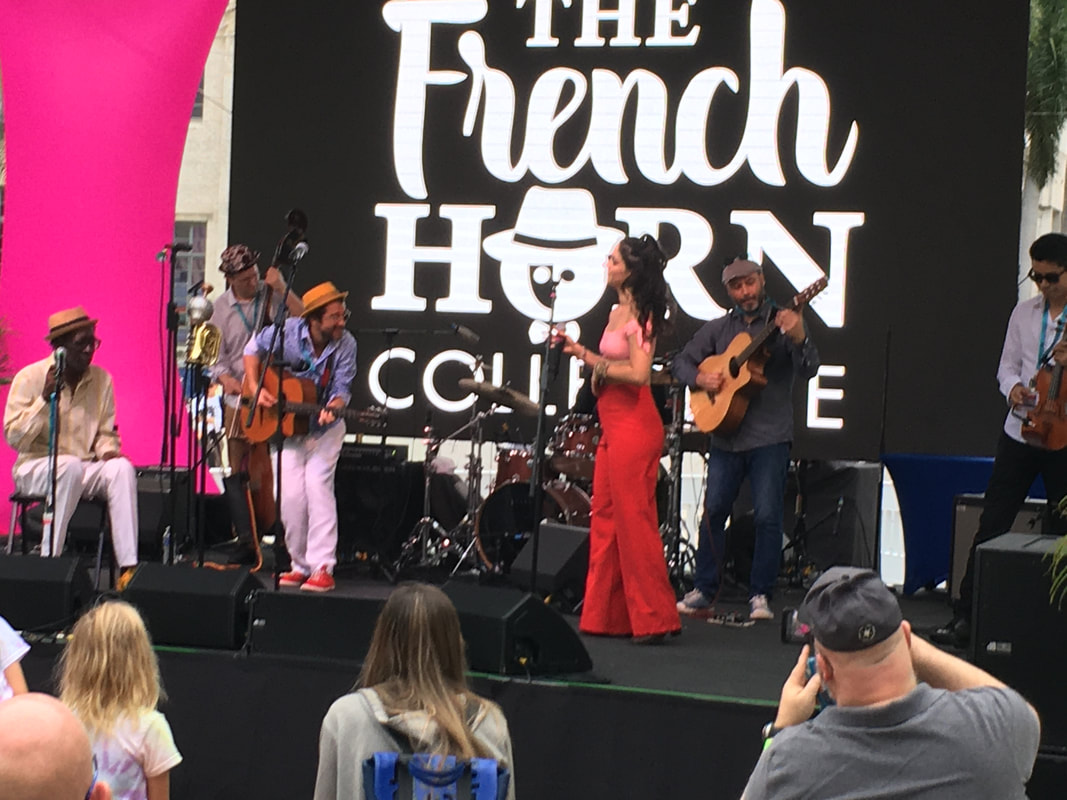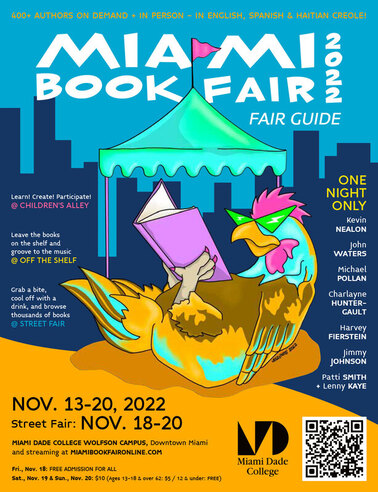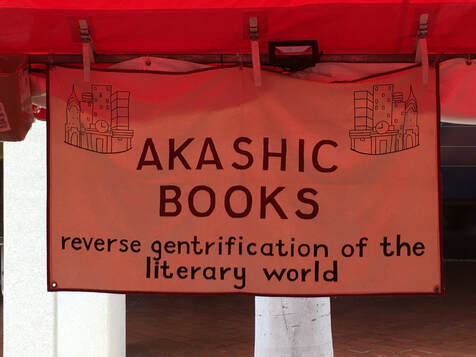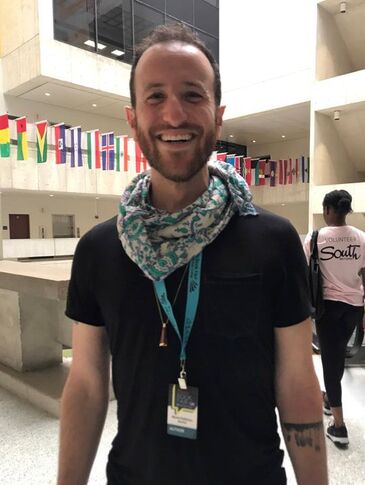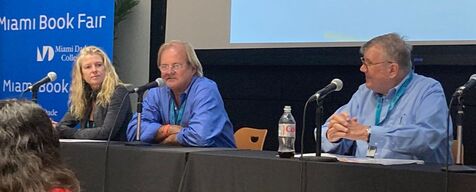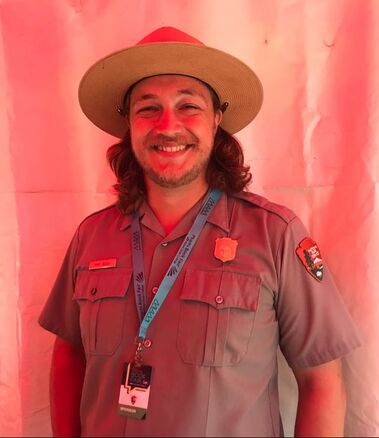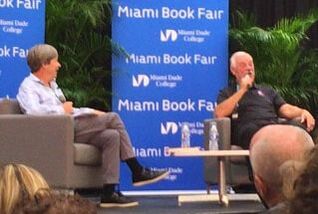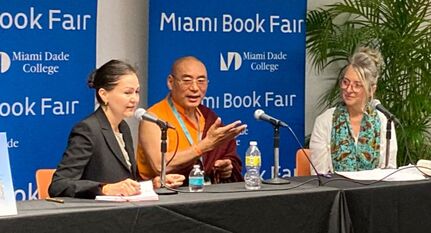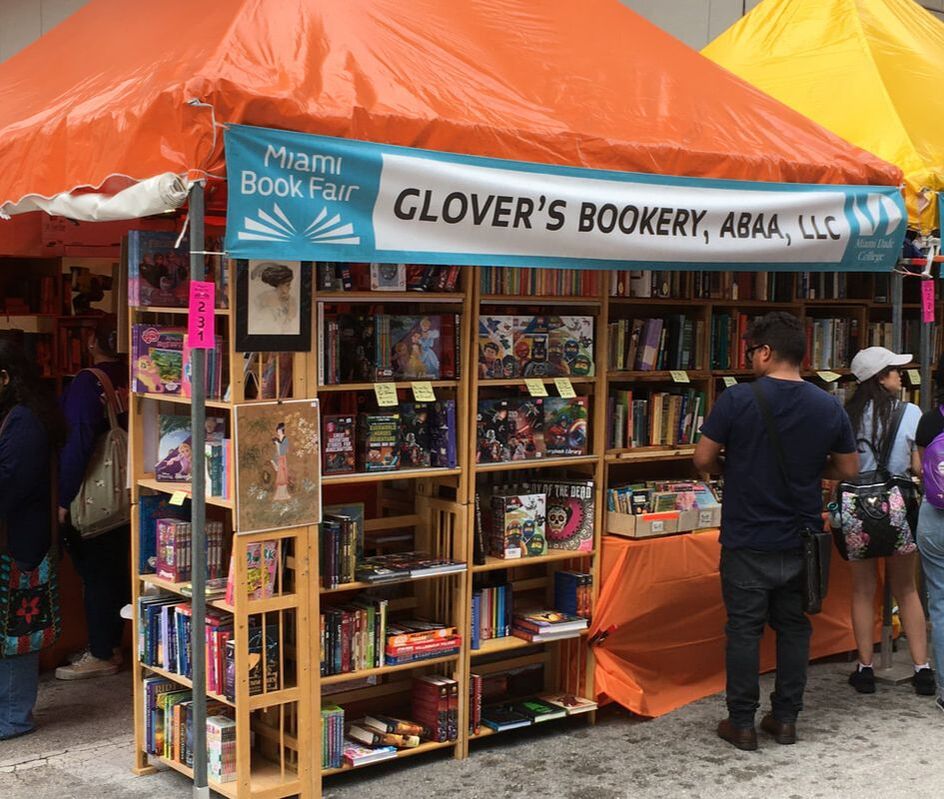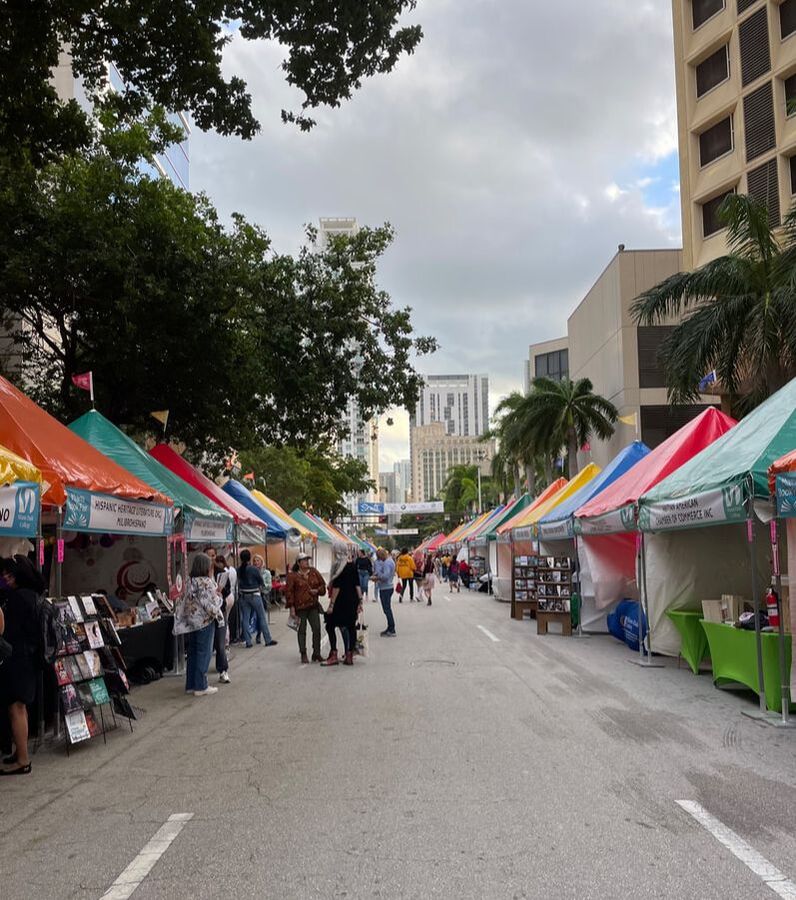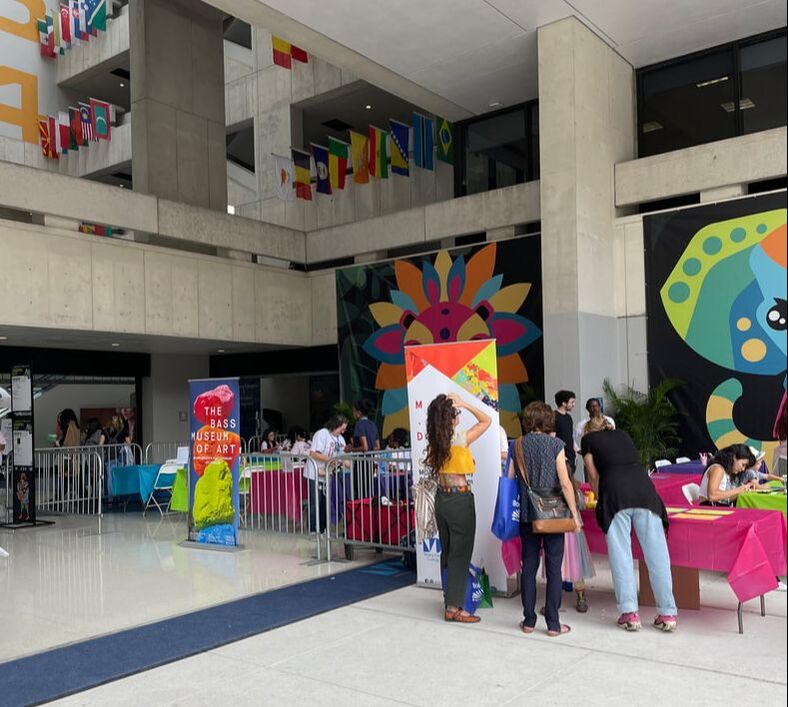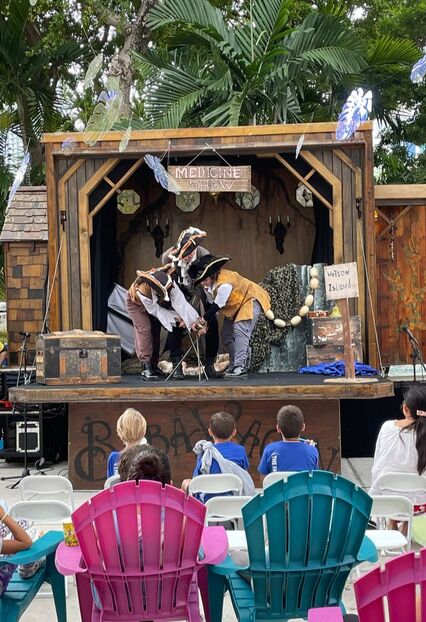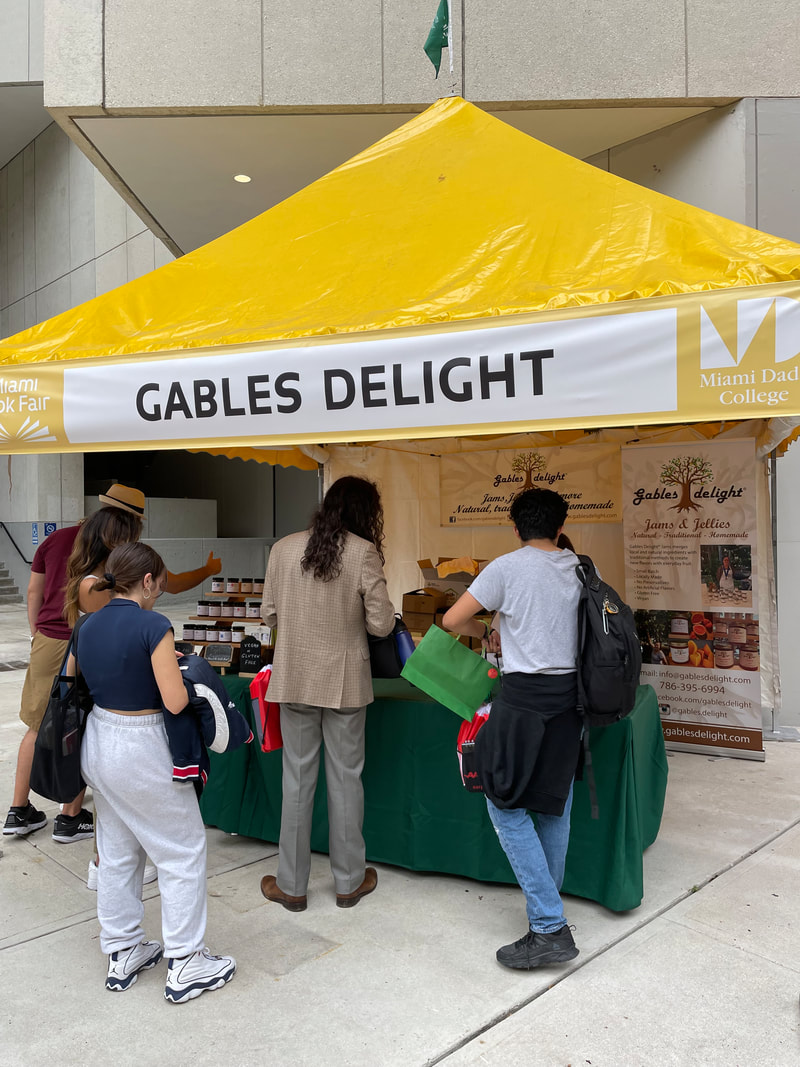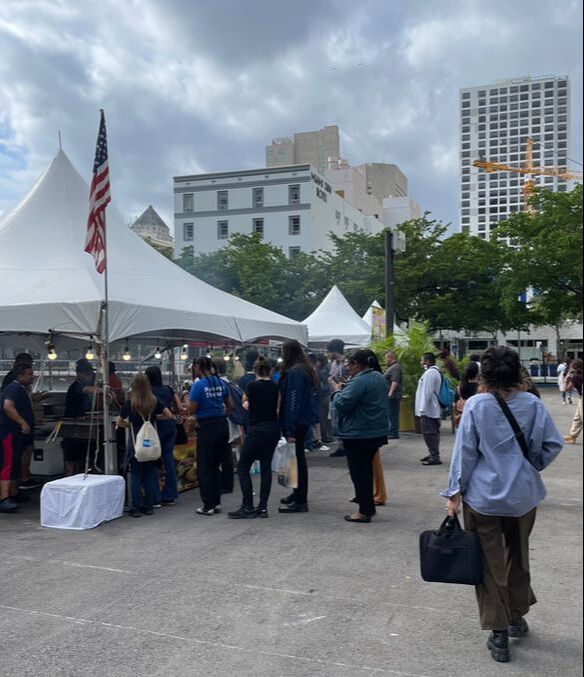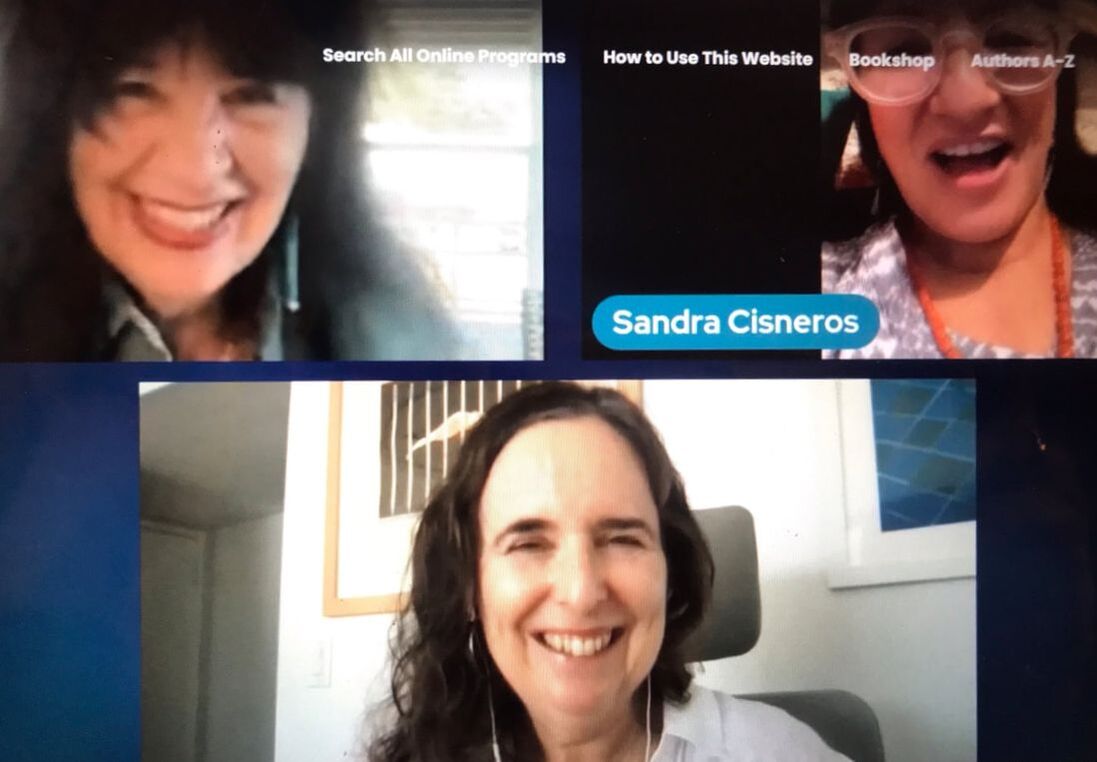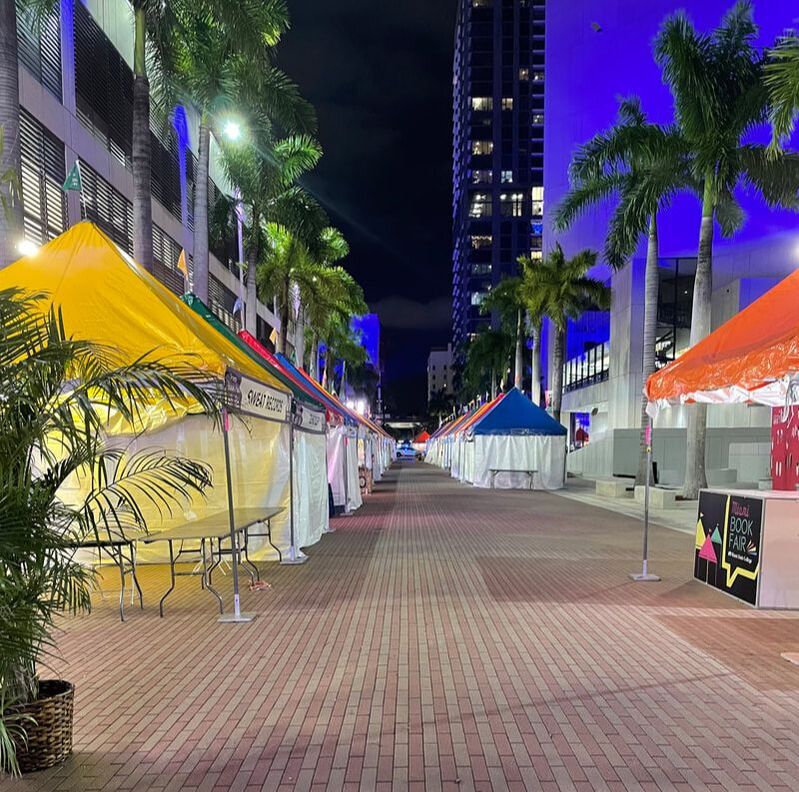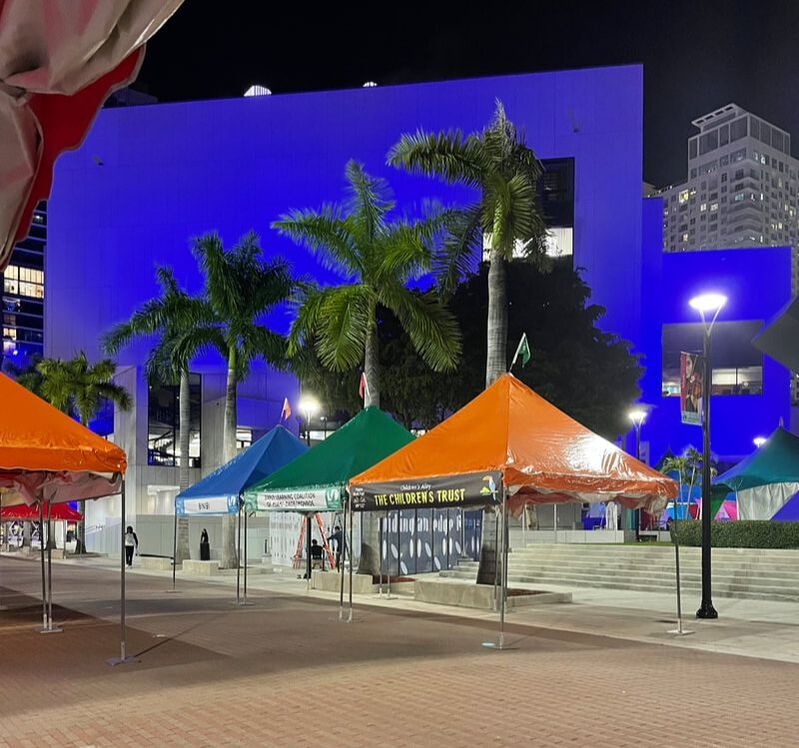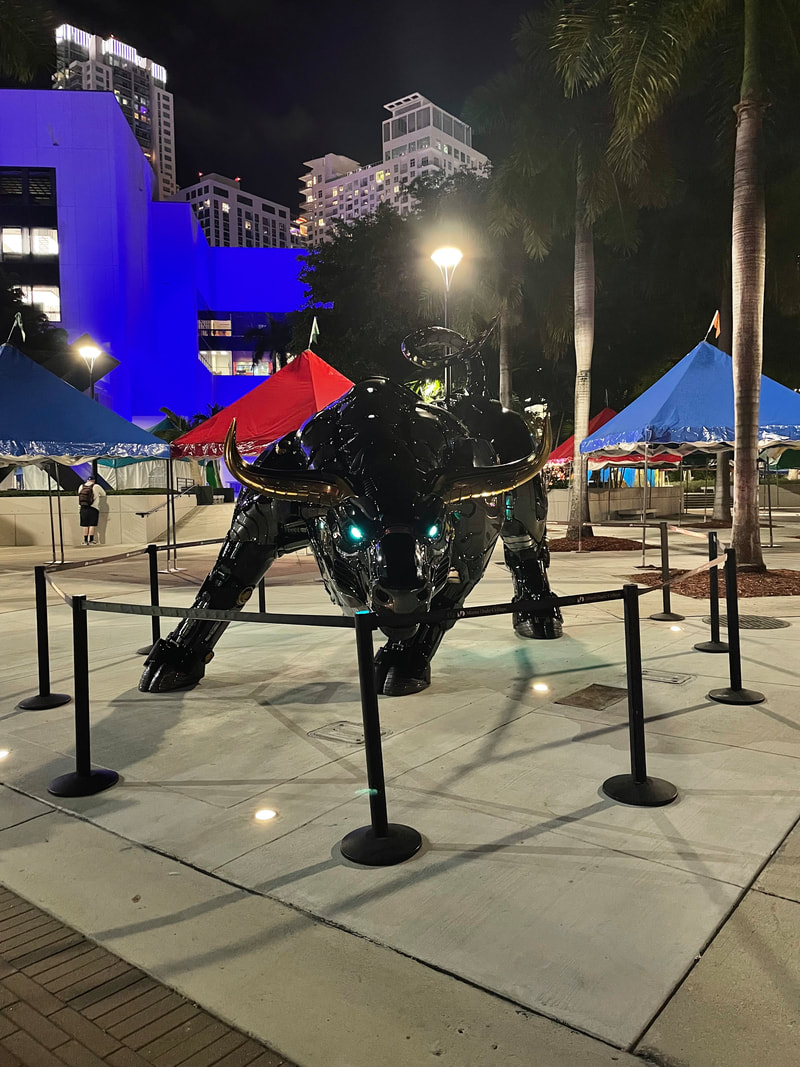Miami Book Fair 2022 Blog
Join us in person or from afar
EDITOR'S NOTE: This blog is posted with newest items at the top of the left column. Many panels are available online, even after the Fair, and we've linked to those panels below.
Sunday, Nov. 20, 2022Sunday, Nov. 20, 2022, 6:37 PM
Hustled home from the Fair in time to see the livestream of Stacy Schiff in conversation with fellow biographer David S. Brown and learn more about The Revolutionary: Samuel Adams. Schiff described Adams as a highly educated (two Harvard degrees) "failure until middle age,” having run the family business (which was actually producing malt, not beer) into the ground and working as the least efficient tax collector on record (probably a point in his favor with the overtaxed populace). But then his “second act” was extraordinary. A revolutionary because of his commitment to fairness and democratic principles, he wasn’t so much a firebrand as an extraordinary organizer, tactician, recruiter, and “convincer in chief.” He got his political start with his fluent pen, burnishing the writings of others. A fundamentally modest man, he didn’t seek center stage, and thus remains under-appreciated. Nonetheless, Schiff said, “you can’t understand the American revolution without understanding the role of Sam Adams.” Point of note: The idea of political parties was in nobody’s plan for governing the united colonies. —Bob Morison Sunday, Nov. 20, 2022, 5:35 PM
On the surface, the story simply seems heartening and redemptive. Nearly five decades after a father, a famous and beloved New Yorker art critic, abandons a writing project, a biography about a famous and beloved New York School poet, his daughter, a successful author, stumbles upon a trove of dozens of old audio cassette tapes of interviews in the basement of her parents’ apartment building in Manhattan’s East Village. Armed with her father’s research, she vows to complete what her father started when she was a toddler, to succeed where he failed. The father is Peter Schjeldahl, the daughter is Ada Calhoun, and the aborted project is now a book, Also a Poet: Frank O’Hara, My Father, and Me. The story and father-daughter dynamics behind this book are, thankfully, more complex and interesting than they seem at first glance. For starters, consider Calhoun’s name, which turns out to be a revealing clue. Why, when she was a young newspaper reporter, did she start writing under her middle name, instead of her father’s surname? Because this was in part how she reinvented herself and “shed the parental shadow hanging over her,” according to a New York Times article by Casey Schwartz from last June. Father and daughter shared a deep appreciation for O’Hara’s poetry, but that doesn’t mean that they were close, or that Schjeldahl even knew that they had this in common. (He didn’t.) There was a lot that he didn’t know about Calhoun, now 46. A doting, involved Dad he was not, even if he was present during her childhood and Calhoun never doubted his love for her. She writes: “My father never bought me presents. He did not know my teachers, my friends, or my shoe size. . . I can’t remember him once asking about my day, making me a snack, or helping me with my homework. . . He just never seemed to find me interesting.” If you’re looking for a conventional biography of O’Hara, who died in 1966 when he was 40, this isn’t it. In part that’s because of the resistance that Calhoun ran into from O’Hara’s estate, which was also what made her father give up on his book idea in the 1970s. Here you find instead a sort of triangular memoir/biography hybrid, a book about her relationship with her Dad, an exploration, in Calhoun’s words, about how two people can “love each other and not see each other.” In 2019, Schjeldahl was diagnosed with stage 4 lung cancer. He was 80 when he died last month, but he lived long enough to read an early draft of the book. Calhoun said she had been afraid to show her father the manuscript because it was so honest. But, she said, “he loved the book, because it was honest.” “He’s shown up for this book, and said it’s one of the best books he’s ever read. That’s been a huge gift—the greatest gift he’s ever given me, actually,” Calhoun said in an interview with The Village Voice last August. “It’s allowed me to forgive him for so much.” —Roberto J. Manzano Sunday, Nov. 20, 2022, 4:14 PM
As I do my late-Fair shopping, many booths have already closed up shop, no doubt due to the rainy-Sunday turnout. Others, with their tarps mostly down, beckon shoppers in with signs or poncho'd staff members. At the University Press of Florida booth, a handwritten neon sign points to a narrow gap entrance, with Florida books still lurking within. Glover's Bookery has consolidated after bumper sales yesterday, with all their books now in the more waterproof interior. Now's the time to find the best deals, though the free books at Author's Solutions and adjacent tents have already been picked clean. Still, I brave the drizzle to snag a couple deals before making my way home. —James Barrett-Morison Sunday, Nov. 20, 2022, 3:40 PM
I caught the start of a comics panel in the Live Arts lounge, and was glad to see returning Book Fair presenter George O'Connor back with the latest in his Olympians series. This one, Olympians #12, tells myths of the Greek god Dionysos in graphic form. He says there are lots of reasons people are drawn to Greek myth—"It's like a hydra!" Greek myths don't speak down to us, they're "cool, edgy and adult," but also timeless because the Gods have personality types we can relate to. Jason Shiga also drew from history for his interactive comic book Adventure Comics: Leviathan. The main enemy is pulled directly from seventeenth-century philosopher Thomas Hobbes' work, with a bit of Legend of Zelda thrown in. And Nathan Hale's Create Your Own Comics also pulls from history for its comic-making challenges. Readers are asked to draw, for example, a cartoon of each US president (with blank space for the next couple presidents included, in case you pick up the book in a few years) in one's own art style. —James Barrett-Morison Sunday, Nov. 20, 2022, 3:39 PM
I was very much looking forward to hearing Mark Kurlansky (I enjoyed his books on both Salt and Cod) on his latest, The Importance of Not Being Ernest: My Life with the Uninvited Hemingway. He gave us a self-deprecatingly entertaining tour of the many ways his life, locations, and interests have overlapped with Hemingway’s. As young writers trying to live in Paris on the cheap (easier in Hemingway’s day). As admirers of the resistant spirit of Basque country (where Hemingway put a minor festival in Pamplona on the map). As frequenters of “Papa’s" haunts in Cuba (where he is still spoken of in the present tense). Kurlansky said that much of the Hemingway machismo is a myth, largely of his own making. “He was better at discussing literature and painting than sports or war.” And he was fine with the simple life: “All of his houses were acquired by his wives. He preferred a small room with a good view.” Kurlansky has made a lifelong practice of keeping a diary including sketches that he then renders as watercolors. A dozen of them grace the book and its cover. The book is published by the Books & Books Press imprint of Mango Publishing, so there are plenty in stock at B&B locations. —Bob Morison Sunday, Nov. 20, 2022, 2:41 PM
The witchy YA panelists are asked about how they craft their plot twists. S. Isabelle (The Witchery) says she's gullible, always fooled by the twist, so to her it's one of the best parts of any story. Melissa Albert (Our Crooked Heart) says she loves best when a number of strange occurrences seem unrelated, but slowly come together and are revealed to all be tied to one, big twist. Alex Aster (Lightlark) begins her books with an outline, which she initially thought "would suck the life out of the writing process," but she found an outline is necessary to craft a twist that will surprise a reader. She adds that her other love is the cliffhanger, which she calls "the best friend of the plot twist." Aster has one last piece of advice to aspiring writers who find their book is going nowhere or is repeatedly rejected. "Those books aren't worthless," she says, because "the best practice for writing a book is writing a book." —James Barrett-Morison Sunday, Nov. 20, 2022, 2:23 PM
The one big Chapman author I was hoping to catch today (Sarah Kendzior on They Knew: How a Culture of Conspiracy Keeps America Complacent) turned out to have cancelled, so I stuck around in Live Arts to see three witchy YA authors. Our Crooked Heart by Melissa Albert hinges on a mother betraying her child, an act of witchcraft, love and revenge. The eerie events start with the discovery of a nude woman on a rural road and build from there. Alex Aster's Lightlark was inspired by the oral tradition of curses she heard from her family. In her novel, the eponymous island's six realms each have curses that reflect their nature, and once a century they have the opportunity to break them. In S. Isabelle's The Witchery, three witches work together to survive the annual emergence of monsters from the woods of their Florida town. Her story, though it contains romance, is about friendship: "How to protect my friend is a big part of the book, in addition to the wolves, and the mess, and the bloodiness." —James Barrett-Morison Sunday, Nov. 20, 2022, 1:44 PM
Laura Krantz (The Search for Sasquatch) asked her co-panelists how they write environmental works for kids, without daunting them by the ecological challenges they're inheriting. S.A. Rodriguez says the protagonist of her novel Treasure Tracks turns the pain of his grandfather's struggles into a mission. And Alan Gratz (Two Degrees) makes sure that his books, while chock-full of dark situations, always end with hope. —James Barrett-Morison Sunday, Nov. 20, 2022, 1:32 PM
I took shelter from the rain in the Live Arts lab, and caught a panel of writers for children and middle grades on the topic of the environment. Good stuff! S.A. Rodriguez's new novel Treasure Tracks is set in South Florida, as a twelve-year-old, inspired by his grandfather's stories of the 1935 Keys hurricane, goes on a treasure-hunting dive adventure. Pablo Cartaya's The Last Beekeeper looks at ecological disaster from a century in the future, as a family finds the last remaining beehive on earth, and must once again save the bees from those who would do them harm. He was inspired by the recent massive freeze and power outage in Texas—"Mother Nature says, you can have your way with technology, but I'm still in charge!"—and by a bee that bothered him while he was first writing the novel. Two Degrees by Alan Gratz follows four kids facing climate disasters, from a fire in California to a stranded polar bear in Manitoba and (of course) a major hurricane in Miami. He thought about setting his book in the future like Cartaya did, but was astounded by how many climate events are happening right now. Laura Krantz was the odd one out, with her nonfiction book The Search for Sasquatch, based on her podcast looking at Bigfoot through a scientific lens. She mentioned that her next book will be taking a scientific look at extraterrestrials—which garnered excitement from the audience and the other panelists. —James Barrett-Morison Sunday, Nov. 20, 2022, 1:30 PM
The “Miami Bitcoin Bull,” installed outside the Miami Beach Convention Center earlier this year for the 2022 Bitcoin Conference, now resides in a corner of the Miami-Dade College downtown campus and Book Fair grounds. Symbol of City of Miami (not to be confused with Miami-Dade County—we have two governments here) crypto-ambitions, the 11-foot, 3,000-pound monstrosity’s value has plummeted. Look for an eBay listing soon, and make sure shipping is included. In related news, the naming rights deal for FTX Arena across the street, home of the Miami Heat, imploded with the namesake enterprise. Ah, Florida! If you’ve run out of swampland, sell them fake money. —Bob Morison Sunday, Nov. 20, 2022, 1:23 PM
Franny Choi reads from her new collection The World Keeps Ending, and the World Goes On. Like many of us, Franny wrote her way through the pandemic, and this was the book that grew from that. Using surprising images, Choi carefully addresses all the apocalypses that have come before the ones in our lifetime. The apocalypse when "Columbus praised God and lowered his anchor." The apocalypse of "dogs and slave catchers whose faces flower by lantern light." The apocalypse of "pipelines legislating their way through sacred water." Choi reminds us that the there's an epilogue to every apocalypse. There have been apocalypses that have destroyed communities, families, and nations—but she also emphasizes that there are always those who survive them. Who carry on the legacy and spirit of those left behind, traded away, and murdered by the brutality of others. The ones who keep their memory alive. The ones who wrote down that we have survived before and will survive again. —Ran Ruado Sunday, Nov. 20, 2022, 1:19 PM
Journalist Stacey Vanek Smith discussed Machiavelli for Women: Defend Your Worth, Grow Your Ambition, and Win the Workplace with Rebecca Fishman Lipsey, president and CEO of The Miami Foundation. Machiavelli isn’t exactly a feminist hero, but Smith’s editor suggested that women can use their version of The Prince. Smith started with the problem at large: The gender pay gap of 20% has persisted for the past two decades. The number of Fortune 500 corporations led by women is actually declining. Some 40% of new businesses are started by women, yet they receive a tiny fraction of all venture capital funding. The book, however, is focused more on what individual women can do to succeed and advance in the workplace. Especially mid-career when leadership roles should be in the offing, but deep bias interferes. “Leaders” are expected to be aggressive, yet women are penalized for same and relegated to “supportive” roles. At critical points—job interview, performance review, salary discussion—the best tactic is often to co-opt the manager into a mutual view of what success will look like (and how much that’s worth). Collaborative rather than confrontational. Pitfall to avoid: The “perfectionism trap” of thinking that competence can gain notice and prevail, when the more important ingredient for advancement is confidence (merited or not). Smith suggests that there can be power—and added confidence—in knowing how the unfair game is played, and in recognizing when you have to make a decision between crappy alternatives. And the discussion ended on a cautiously optimistic note—that the panelists hope times are changing (driven in part by women outpacing men in education) and then "the book’s advice will feel stale in the future." —Bob Morison Sunday, Nov. 20, 2022, 12:49 PM
When asked about his novel's setting, Palm Springs, Steven Rowley calls it pivotal to his novel The Guncle, as two kids from Connecticut experience their uncle's hippie desert town for the first time. This leads Bobby Finger (The Old Place) to describe his novel's small town in Texas as "the third main character." He had to learn his hometown's history in order to write such a town faithfully, though he did rename it. Shelby Van Pelt (Remarkably Bright Creatures) says she loves a small-town setting, but she prefers to invent one, in order "not to make any locals mad when you get details wrong." Having grown up here and encountered many inaccurate depictions of Miami in books, I'd say this applies to big cities too! —James Barrett-Morison Sunday, Nov. 20, 2022, 12:22 PM
Independent bookstore owner Jeff Deutsch discussed his book, In Praise of Good Bookstores, with a panel of authors moderated by New York Times writer and regular Book Fair presenter Pamela Paul. If we no longer need to go to a bookstore to buy a book, why do we need them? For the browsing experience and discovering books new and old. For the erudition of booksellers making great suggestions without need for algorithms. To enjoy being part of a book-loving local community with author events, book clubs, and a place to socialize — what panelist Tananarive Due called "a community oasis." Deutsch said that “nobody expects to be a bookseller.” But once in the business, booksellers prove a resourceful lot. The COVID-19 pandemic decimated retail sales, but it also offered hopeful lessons. Customers realized how crucial independent bookstores, and small businesses generally, are to their communities. Enterprising booksellers adjusted their business models and found new revenue streams (Deutsch was the first to reestablish his bookstore as a not-for-profit operation). The bottom line: It’s not just about selling books. A good bookstore is a valuable product in itself. —Bob Morison Sunday, Nov. 20, 2022, 12:20 PM
The three panelists at the noon panel in the Magic room learned that they all have written main characters who are getting on in life, in retirement, but facing the challenges of adjusting to their new life phases. The Old Place is nominally about a town in rural Texas, but centers on a retired schoolteacher, as she confronts a lifetime of secrets brought to light in one week. He likes writing older characters because "it provides comfort in the face of one's own fear of aging and death," by showing "we can always pivot, change and evolve." Steven Rowley's latest novel, The Guncle, tells of a retired gay man who "inherits" his niece and nephew for a summer after their mother, his sister, passes away. He felt responsibility not to sidestep the grief the children experience, while keeping the story comedic and centered on their uncle, who is forced to confront his new life while grieving himself. Shelby Van Pelt's Remarkably Bright Creatures, on the other hand, has a giant Pacific octopus as narrator, confronting his own mortality. But it is also about an aging woman who befriends him at his aquarium. The novel is about them both "finding newness later in life," which all three agreed could be descriptions of their own protagonists. —James Barrett-Morison Sunday, Nov. 20, 2022, 11:39 AM
The three writers at this panel mentioned ways that place plays in to their writing. In preparation for her memoir The Men Who Could Move Clouds, Ingrid Rojas Contreras took photos in her grandfather's Colombian community, and said her photos were of a place but had a narrative intent. So, a photo of a spot of forest where a ghost had been seen is an entry portal into that ghost story. Meng Jin (Self-Portait With Ghost) has been asked by readers why she never sets her stories in specific places, and was surprised by the question. She pondered and realized that she "didn't want to be sociologized" as a person born in one country but growing up in another, and "never felt the ability to claim illusory ownership of place." Dionne Irving (The Islands) gave Vitamin D deficiency as an example of "the ways that place can or cannot be hospitable to the body," and she explores the relationship between body and place in her stories. —James Barrett-Morison Sunday, Nov. 20,2022, 11:30 AM
FREE entry for all – it’s an MBF last day special! I was already at the Street Fair when I got a message from MBF saying that admission fees have been waived for today: "A little rain never hurt anyone. Come Downtown for Miami Book Fair's last hurrah." As I made my way along the street (the rain has eased up to a mist), I poked my head into tents where exhibitors had been moving tables and rearranging displays to keep them away from any gusts while pinning back a flap to make sure passersby could enter. The University of Florida Press, Books & Books, WDNA 88.9 FM Serious Jazz, writers on Authors Row were all figuring out how to be accessible yet stay dry. (We do have a lot of practice in Miami.) And of course the sessions and signings indoors are all going on as scheduled. —Lynne Barrett Sunday, Nov. 20, 2022, 11:24 AM
Meng Jin was going to read from one story of her collection Self-Portrait With Ghost, but spotted children in the audience, and "that story is not for children!" She picked another, written from a child's perspective of her elders who she can never quite tell apart. Dionne Irving's story collection The Islands comprises tales of Jamaican women across the world, from 1950s London to modern New Jersey. She also read a story from a child's view, one working in a strip-mall kitchen and dreaming of her expected and unexpected futures as a child of immigrants. The Men Who Could Move Clouds by Ingrid Rojas Contreras centers on an accident that left her with severe amnesia, and reflecting on similar amnesia-inducing events in her Colombian family history. For other family members, an amnesia accident was the unlocking of power as a traditional healer, and her memoir explores that along with the dramatic uncoupling from reality her own experience caused her. —James Barrett-Morison Sunday, Nov. 20, 2022, 11:13 AM
I attended the first poetry event on Sunday at the Miami Book Fair. It was "Poetry for the People" with Richard Blanco, Gianna Russo, Olive Senior, and Nicole Tallman. Each poet did a strong, beautiful reading from their respective books. But unexpectedly, the most interesting part of the event occurred after their talk, during the autographing session. A startling number of people lined up in the small autograph area to have their books signed. Many were excited to meet and share their stories with Richard Blanco, best known as one of President Barack Obama's inaugural poets. More and more people joined the line to meet the poets well after the designated ten minutes of signing—this crush of people created poetry pandemonium. The autograph session spilled over into the second panel's time, with people still joining the line. Twelve minutes into the next panel's time, Blanco's session was called. He was directed to get up and leave so the next panel could start. It was a potent example of poetry enthusiasm. —Yael Valencia Aldana Sunday, Nov. 20, 2022, 10:10 AM
Day two of the Fair is kicking off with some pretty intense rain. Forecast is intermittent precipitation throughout the day. Vendors are slow to open their Street Fair booths this morning, both to keep the precious books dry and because of the small number of souls braving the rain. Hopefully things will be open by this afternoon when I plan to do my shopping. —James Barrett-Morison Saturday, Nov. 19, 2022Saturday, Nov. 19, 2022, 6:37 PM
One of the final events of Saturday afternoon was a talk with Sandra Cisneros and Manuel Muñoz. Cisneros is the author of the new poetry collection, Woman without Shame, and Muñoz's latest book of short stories is The Consequences. The authors are friends, and the talk was an easy banter between the two of them rather than a formal author talk. They started on a light note. Cisneros and Muñoz both expressed their mutual confusion as each thought that they were to interview the other. They then read from their books. Cisneros' poem was about a donkey (a burro), and Muñoz read an excerpt from a story about a pregnant high schooler. Muñoz then held up a pair of donkey socks Cisneros had given him. Cisneros then introduced some of the writers who came to support her, Ruth Behar, Richard Blanco, and Edwidge Danticat. Their conversation was wide-ranging and charming. I was surprised to learn that Cisneros gave Muñoz the first blurb on his first book, Zigzagger, from 2002. She called the work sexy, sweet, and cool. Cisneros lamented that they were considered Latinx writers and not simply American writers. She and Muñoz both believe the subcategorization of "Latinx writers" limits the coverage of their work in mainstream media. During the question-and-answer section, I asked them if they could each share a moment they felt solidified their sense of self as an author. Muñoz spoke about a moment in a coffee shop when he sat before a blank notebook. He realized no one was watching him, and he could write whatever he liked. Cisneros talked about writing her second poetry book, My Wicked Wicked Ways. She said that she didn't censor herself when she wrote this book, that she wrote for herself as if she would never publish the poems. She felt this approach freed her to say things in a way that frightened her and made her feel vulnerable. She thought that if a poem was not disquieting in some way, it didn't go far enough. Cisneros ended the talk with advice: To tell the truth but not hurt anyone. She said to write what you need to but change people's names and genders in a way your subject wouldn't see themselves. Muñoz agreed with her and felt that this was some of the best advice he had ever received. —Yael Valencia Aldana Saturday, Nov. 19, 2022, 6:33 PM
Lenny Kaye is a musician (founding member of Patti Smith and Her Band), writer, and music historian (an earlier book was on Bing Crosby and crooners of the 1930s) who “grew up on rock and roll.” Who better to relate the times and places that launched new eras of rock and roll? Kaye discussed Lightning Striking: Ten Transformative Moments in Rock and Roll with arts and style journalist and author Rachel Felder. The book’s ten chapters travel from Cleveland 1952 to Seattle 1991, with stops in between including Philadelphia 1959 with American Bandstand and Liverpool 1962 with the Beatles and the genesis of the British Invasion. He doesn’t play favorites: “I never say music was better back then.” And he values creativity: “Once a musical trend is figured out, it’s time to move on.” He’s fond of the also-rans, mentioning the early punkish group The Miamis. And he’s part archaeologist: “There’s so much great undiscovered stuff.” On cue, Kaye grabbed his guitar to sing a song he wrote about books, on the occasion of “World Book Night.” The session was livestreamed and archived, so you can enjoy it here. —Bob Morison Saturday, Nov. 19, 2022, 6:26 PM
As a semi-former birder, I had to wrap up my Saturday with a panel on birds and the world they inhabit. Tony Hiss launched the panel with the big picture. His book, Rescuing the Planet, is a call for us to protect half of Earth's land in order to save 90% of its species, up to a million of which are currently under threat. He briefly told the history of the changes in perspective, from the 19th century "view that subtraction [of natural environments and native peoples] had to precede addition [of modern, industrial society]" to one of preservation with the rise of National Parks and public works like the Appalachian Trail. He said we are now moving into a third view, on the scale of planetary thinking. Sy Montgomery (The Hawk's Way) and Jack E. Davis (The Bald Eagle) focused on specific birds. Montgomery said that her book is a love story with hawks, and with one hawk in particular, a feisty Harris's Hawk named Jazz. She showed photos of Jazz and other hawks she worked with in her life of falconry, sharing her love of them with us. Davis began by reading a section of his book written from the perspective of two newly-hatched eaglets, visited by an environmentalist intent on banding them. This terrifying experience for the baby birds is actually a story of their salvation, as banding of Bald Eagles was instrumental in illustrating their decline due to DDT and poor water quality, a decline reversed in the 1960s and 70s. "There's plenty of grim tragedy in the Bald Eagle's history," Davis says, "but also redemption and restoration." —James Barrett-Morison Saturday, Nov. 19, 2022, 6:04 PM
Sy Montgomery (The Hawk’s Way) described her love for falconry hawks, but the relationship seems a bit one-sided: “The whole relationship is on their terms. They allow you to serve them, to partner in the hunt.” —Bob Morison Saturday, Nov. 19, 2022, 4:58 PM
No way could I pass up an anthologies panel featuring a book titled Pathetic Literature, edited by Eileen Myles. We’re not talking “pathetic” in the contemporary sense, which might suggest good examples of bad writing, but rather in the classical sense of works evoking “pathos” or strong feeling. Myles is on a mission to rehab the term to its earlier and deeper meaning. The collection is global, cross-genre, classic-and-contemporary, and includes writers well known (Kafka was mentioned several times) and not. The discussion got a bit literary-theoryish in places, and I got no real sense of how a given work makes the pathetic cut. But the book lists at 688 pages, so there must have been an enormous stock to choose from. The other anthology discussed was Freeman’s Animals, edited by John Freeman, a collection of stories in which animals play leading roles, not just bit parts. One of the stories, “On Jawless Fish,” is by Tess Gunty, whose novel The Rabbit Hutch just won a national book award. Gunty appeared as a bonus panelist, reading from and discussing the story. —Bob Morison Saturday, Nov. 19, 2022, 4:48 PM
Inflation is indeed rampant. The price of arepas is up to 8 bucks. But they’re still a not-to-be-missed Book Fair treat. Just don’t push the price point too far. . . —Bob Morison Saturday, Nov. 19, 2022, 4:43 PM
I caught the end of photographer Anastasia Samoylova's talk on her new book, Floridas, which juxtaposes her recent photos of South Florida with those of Walker Evans, who documented the state from the 1930s-70s. Hers focus on what she calls an "indirect perspective of what climate change looks like in daily life," of hurricane-swamped swimming pools and flooded streets. The photos also show the contrast of structures as Miami neighborhoods gentrify—new, glass-and-steel edifices next to mold on stucco. In doing so, she captures the "denial, resistance, resilience, adaptation" of a city under climatic transformation. —James Barrett-Morison Saturday, Nov. 19, 2022, 4:22 PM
This year’s Book Fair sports beat naturally centers on the 50th anniversary of the Miami Dolphin’s 1972 perfect season, culminating in the team’s first Super Bowl win. Marshall Jon Fisher discussed Miami, 1972, and the NFL’s Only Perfect Season with sportswriter Michelle Kaufman. Fisher was 9 years old and attended one Dolphins game at Ye Olde Orange Bowl in 1972. He said he’d long wanted to write the book, and the big anniversary was the occasion. His research included the newspaper accounts of the day and interviews with sportswriter elders and half of the 20 surviving members of the team. The book is about the place and the era as well as the team and the games. “For a black player, Miami was not a great place to be traded to.” Yet coach Don Shula jumped at the chance to acquire wide received Paul Warfield and create an unbeatable combo with quarterbacks Bob Griese and then Earl Morrall. Fisher said that Shula integrated the locker room, which had been blacks on one side, whites on the other, not entirely because it was the right thing to do, but because the team needed to come together to win. And they did. —Bob Morison Saturday, Nov. 19, 2022, 4:16 PM
Elizabeth Williamson summarized for us the saga of Alex Jones' abominable and interminable claims targeting the families of the victims in 2012's Sandy Hook Elementary shooting. To write her book, Sandy Hook: An American Tragedy, she interviewed and followed some of those families through their lawsuits against Jones, which just this week led to a $1.2 billion judgement against him. The families were not truly seeking money, she says, but "what they really want is to send up a red flag" that the decade of harassment and torment they experienced is a warning of what can happen to all of us, to our society and to our democracy. Her co-panelist, forensic anthropologist Erin Kimmerle, detailed a different campaign of harassment she, and the families of victims of the Dozier Reform School in Marianna, Florida, experienced as they tried to exhume the bodies of boys killed and buried on the school's grounds during its century of terror. Even after hundreds of men came forward in 2005 to describe the abuse, neglect, forced labor and mysterious deaths, they faced vast political and community pressure to silence the investigation. Only an appeal to the Florida Cabinet and a media campaign eventually led to the school's 2011 closure and the exhumation of more than fifty bodies, many of which have now been reunited with their families after decades of grief. —James Barrett-Morison Saturday, Nov. 19, 2022, 3:43 PM
The Florida outdoors panel including Craig Pittman and Manatee Insanity was standing room only. But at the Book Fair there’s always a delightful Plan B ready at hand. Caught the end of The French Horn Collective set at Off the Shelf, including their encore doing the most energetic “Sweet Georgia Brown” you’re likely to encounter. Next on stage was the launch of Miami’s Favorite Poems Project, hosted by inaugural poet and Miami-Dade’s new poet laureate, Richard Blanco, and Miami-Dade’s poetry ambassador, Nicole Tallman. What other place has a poet laureate and a poetry ambassador? The readers of favorite poems (not their own) represented the breadth, depth, and diversity of the South Florida poetry scene. Plus special guest readers Miami-Dade Mayor Daniella Levine Cava, Miami Dade College President Madeline Pumariega, and out-of-towner poetic luminaries Sandra Cisneros and Robert Pinsky. So much talent in one serving—must be the Book Fair. —Bob Morison Saturday, Nov. 19, 2022, 2:48 PM
Park Ranger Alan Scott asked the Everglades panelists about a personal wildlife experience they've had. Craig Pittman (Manatee Insanity) spoke of swimming with manatees in Crystal River, where he struggled to adjust to his wetsuit and scared the gentle creatures away. Anne McCrary Sullivan (The Everglades) spoke of a calmer encounter, breakfasting with a manatee next to her canoe. And Clay Henderson (Forces of Nature) let us know that panthers, like other cats, don't like water, as he discovered when he had a run-in with one on a boardwalk after a flood. —James Barrett-Morison Saturday, Nov. 19, 2022, 2:41 PM
Neuroscientist and novelist (Still Alice) Lisa Genova has encouraging news about our brains as they age. Her TED talk on what you can do to prevent Alzheimer’s has been viewed over 8 million times. Her new nonfiction book, Remember: The Science of Memory and the Art of Forgetting, reassures us that forgetting little things—Where did I park the car? Where did I put my cellphone?—is quite normal. The human brain isn’t programmed to remember everything (proper names can be particularly troublesome). When we forget things, it’s usually because we hadn’t focused any attention on remembering in the first place. Her book puts the science of memory into everyday human context. Author and journalist Daniel Bergner discussed The Science of Our Brains and the Search for our Psyches, a science-plus-memoir centered on understanding the experience of his brother, who is bipolar. Moderating the panel was neuroscientist and author Melodie Winawer. The three discussed the blurry lines between mentally well and infirm (consider the autism spectrum) and how people can be quickly and unfairly “otherized,” when the order of the day should be connection, understanding, and empathy. —Bob Morison Saturday, Nov. 19, 2022, 2:36 PM
It turns out that the Fair is filled with panels on the Everglades this year, in anticipation of the National Park's 75th anniversary just weeks away. Park ranger Alan Scott hosted a panel featuring three authors with different perspectives on the Park and its ecosystem. Clay Henderson's Forces of Nature covers the hidden history of the Everglades, a place whose narrative is often one of encroachment and domination by the growing cities that surround it. Instead, the environmental lawyer and former president of the Florida Audubon Society tells of the many people involved in its conservation over the last century. He said that "the Everglades is a political construct," and that its history is bound up in the stories of local businesspeople, state representatives, and even US presidents who have shaped it today. Environment reporter Craig Pittman's latest book talks Manatee Insanity, and his adventures learning about the great swimming beasts. He pointed out that our relationship to conservation is one of choices, as saving one bird might eliminate a tree species, which helps yet another species flourish. Anne McCrary Sullivan's tale is more personal, of her decades paddling the length and breadth of the biome, and the stories she has collected from those who live, work and play in the backcountry wilderness of the Everglades. The Everglades: Stories of Grit and Spirit from the Mangrove Wilderness collects interviews with twenty-one such people, who are those on the front lines, literally and figuratively, of Florida's great wetland. —James Barrett-Morison Continued in the next column...
|
2022 Miami Book Fair In-Person & OnlineThe 2022 Fair is back and bigger than ever, featuring both in-person and virtual events! You can see the full 2022 schedule and learn about the in-person and online events at https://ww.miamibookfair.com/welcome-to-miami-book-fair/
Virtual events this year can be seen via the Miami Book Fair Online website at miamibookfaironline.com even after Book Fair Week. Note that some Book Fair promotional materials link you to an alternative address at miamibookfair.com, but to view virtual events you must use the miamibookfaironline.com site. Certain events being held in-person require tickets to be guaranteed seating. Most in-person events are free with Fair admission, and virtual events are free and can be watched after the fact as well. To find information on all of this year's events, check out the downloadable fairgoers' guide via the MBF website. The FBR Blogging TeamReporters
James Barrett-Morison (Reporter and Editor) Giselda Aguiar Yael Valencia Aldana V. Calderin-Lemus Roberto J. Manzano Bob Morison Ran Ruado Lynne Barrett (Florida Book Review Editor) More bloggers will be listed as contributions come in. Saturday, Nov. 19, 2022, continuedSaturday, Nov. 19, 2022, 1:54 PM
Once in a while you attend an authors’ panel that rattles you in a good way, a necessary way. That was my experience while listening to panelists who contributed to the anthology More Than What Happened: The Aftermath of Gun Violence in Miami. According to the O, Miami website, in the book, through “poems, photographs, interviews, portraits, illustrations, and one sermon, Miamians talk about how they survive, grieve, and process the loss of children, parents, and friends.” For the most part, the panelists weren’t published authors. They weren’t journalists or academics. These were real, regular people who have endured and survived traumatic experiences that should lead to societal shock, outrage, and change. Instead, these incidents barely register for longer than a day’s headlines and are then quickly forgotten. The hard, ugly truth is that we live in a city where gun violence in certain neighborhoods is the tolerated norm, where the privileged—here’s looking at me—prefer to believe that as long as it’s not happening in their neighborhood, then it’s not their problem. LeeBetsy Charon, an accountant, entrepreneur, and self-described “mommy of six,” told of an ex who came to her home one morning when she and all her kids were there, two of them awake and four asleep. He beat her with a gun and shot at her and her daughter. His bullets missed them by inches, she said. “I see you standing there, with your evil glare,” she said while she read from her poem. After feeling repeatedly only as a victim in the aftermath of the attack, as she contended with the system (the police, family court, criminal court), Charon said she found it “refreshing” to get to share her story in the anthology: “I’m here, my kids are here, and I can’t be more blessed.” Arsimmer McCoy, a collaborative artist, cultural worker, and middle school teacher from Richmond Heights, spoke of neighborhoods where gunfire is so common that residents can distinguish not only the sound of gunshots from firecrackers, but the sound of gunfire from different types of firearms. “One shot rang out,” she said again and again, as she read from her poem about a four-year-old girl who died in an accidental shooting. “You need to get this book. You need to get mad. You need to cry. You need to be depressed,” McCoy said. “We have to break this cycle.” —Roberto J. Manzano
Rothman-Zecher is at the Miami Book Fair to support his newest novel, Before All the World. It is a tale set in the 1930’s of community between Jewish immigrants and a Black man during a particularly fraught time in both their histories. He is to participate in a panel on Sunday, and you can find him online at MorielRothmanZecher.com.
—Yael Valencia Aldana Saturday, Nov. 19, 2022, 1:06 PM
Of course, it only takes a couple hours for panels to start to run late, as happened at the Florida history and environment panel I stopped into this morning. But the presenters more than made up for it with their insightful and funny tales of Florida. Wildlife photographer and author Kirsten Hines and ornithologist James Kushlan dug into the natural and human history of Florida for Everglades National Park, their third (following books on Key Biscayne and the Dry Tortugas) in their Images of America series. And just in time—the 75th anniversary of the Park is next month! Kushlan invited us all to the celebrations to be held in the Park in December. Hines "found the pictures that tell the story" of the Everglades by digging through the archives, but had difficulty culling some of her favorite photos that didn't quite fit in to the book. The pair spoke on the Park's origins, saving egrets hunted for their feathers and royal palms found nowhere else but here and Cuba, as well as its latest updates, touching on the ongoing elevation of the Tamiami Trail to improve water flow into the swampland. As a teacher, James C. Clarke began his presentation on A History Lover's Guide to Florida with a pop quiz—Tallahassee is about to hit its bicentennial as Florida's capital... but what city was its capital for more than 250 years before that? The answer, of course, is Havana, and Clarke said that Havana still holds vast records of the state's early history. Clarke emphasized how truly ancient Florida is, such that "at the time of the colony of Jamestown [in Virginia], St. Augustine was already undergoing urban renewal." Other anecdotes on Florida's first flag, the rise of Publix, Burt Reynolds and more rounded out the presentation. I'm glad I didn't miss it! —James Barrett-Morison Saturday, Nov. 19, 2022, 12:55 PM
My favorite thing at the Miami Book Fair Street Fair was stopping at the Everglades National Park booth. Ranger Matt Booth stood in front like a sentinel. He is very tall, 6’3. I wanted to know one thing: How was the Florida panther doing? The Florida panther is a great cat that is native to the Florida Everglades. It is an endangered species, and only approximately 200 adult panthers remain. Ranger Booth was fully informed. The Florida panthers are just doing OK. But they just imported mountain lions (the same species) from Texas to diversify the Florida population. With so few adults, the Florida panthers needed some genetic diversity to keep their population healthy and resilient. I have a particular interest in the Florida panthers. I am a graduate of Florida International University (FIU), and our mascot is the panther. Students of FIU are called panthers. The panthers are still endangered, but our mascot keeps surviving and keeping on. —Yael Valencia Aldana Saturday, Nov. 19, 2022, 12:54 PM
“Don’t shake the spoon, man.” When he was in prison, that was Darren Tinker’s request to the fellow inmate plopping chow onto his plate. The phrase may befuddle those on the outside, but on the inside it’s familiar slang, a way of asking for a clean, full serving, without any chunks or morsels shaken off. Tinker, 27, acknowledged that prison grub was “garbage,” but on the inside, “we want all the garbage we can get.” Tinker spent more than three years in Florida state prisons for a crime he did not commit, according to the Miami Book Fair website, and he participated in Exchange for Change classes. The Miami-based nonprofit offers courses to incarcerated students across Florida. It also publishes Don’t Shake the Spoon: A Journal of Prison Writing, now in its second volume, which contains students’ work. Tinker recalled that in prison, the future seemed “bleak,” he struggled to find a purpose, and he asked God, “Why am I here?” He read from a poem dedicated to a friend, who he called a “king,” and who helped him cope when he was in despair: “I met a gift to the world, you all, but he ain’t ever coming home.” Writing classes transformed his life and revealed another path, making him wonder, “Maybe I can be good. Maybe I can help.” “All the beauty I see now comes to me in words,” he said. —Roberto J. Manzano Saturday, Nov. 19, 2022, 12:14 PM
Dolfans were out in force, many in team regalia, some in treasured “39” jerseys, to see legendary Miami Dolphins fullback Larry Csonka discuss his book, Head On, with Dave Barry. Standing ovation when he took the stage. The book appears as we celebrate the 50th anniversary of the Fins’ perfect season, but Csonka said he’s had it in mind for some time, then only felt free to write it after coach Don Shula passed away. One storyline follows the player’s hate-turned-love relationship with the coach. What did the expansion club and its perfect season mean for Miami at the time? Cheering for the Dolphins provided a bit of common ground in a city deeply divided racially and ethnically. On his head-on, bowl-them-over running style, Csonka admitted to being a bit selective. He would gladly take on most opponents, and gleefully take on defensive backs. But he’d seek detours when confronted with Dick Butkus, Mean Joe Greene, or Bob Lilly. On the game today: the rules have made football much safer for the players and made the game more competitive, because with so much passing, scoring can happen in a hurry and games aren’t necessarily out of reach. The days of grinding, clock-consuming, fullback-with-the-ball ground games are behind us. But that causes no regret. The one decision Csonka rues is following the dollar signs to the WFL and then closing his career with the Giants. A Dolphin to the core. —Bob Morison Saturday, Nov. 19, 2022, 12:01 PM
Prohibition repealed! After a parched Fair in 2021, adult beverages are back at two locations of the Top Shelf Bar, one conveniently located near the Off the Shelf stage. Featuring beer, wine (even a refreshing French Rosé), spritzers, mimosas, and more. Thank you, Book Fair Gods! —Bob Morison Saturday, Nov. 19, 2022, 11:54 AM
I often like to kick off my Fair weekend with an inspiring start, so this year opted to head to a panel by Tibetan monk Khentrul Lodrö T'hayé Rinpoche on The Power of Mind: A Tibetan Monk's Guide to Finding Freedom in Every Challenge. And, based on the packed house in room 8202, it looks like other Fairgoers had a similar idea! Khentrul Rinpoche spoke on the process of mind training with translator (both of the book and in the panel) Paloma Lopez Landry, and with Suzanne Jewell of Patch of Heaven Forest Sanctuary. Prompted by Jewell's questions, he said he felt the need to write this book to highlight our current "time of rapid change and adversity, both internal and external." He explained that the core of the book is to frame like and dislike as a way of thinking, and that by focusing on our every dislike, we open ourselves to suffering. His message is to build a habit of not being disturbed by things, saying "Don't hate; focusing on what we hate doesn't change the circumstances" that bring about our dissatisfaction. I'll keep that in mind during the oft-chaotic Fair weekend! —James Barrett-Morison Saturday, Nov. 19, 2022, 11:17 AM
Always fun to peruse the titles on Writer's Row, where authors promote their wares. Saturday’s offerings have a temporal theme: 9 Years Gone, It'll Happen By 30, and El Libro de los Eternos. There are the usual interesting juxtapositions, including Enjoy Your Solo versus Leading Inclusion. In the kid’s category, I’d go for Claire’s Tomato before Grandpa’s Cheese. And I’m giving a wide berth to The Homicide Manifesto. —Bob Morison Saturday, Nov. 19, 2022, 9:33 AM
Preliminary walk-around of the Fair grounds. Great to see what may well be the two longest-tenured Book Fair booksellers not named Books & Books. Akashic Books, who publish the prolific Noir series (including Miami Noir and Miami Noir: The Classics) have been bookfairing for some 20 years. Glover’s Bookery, purveyors of fine old and used books, has been around for about 25, dating back to when the “antiquarian annex” was indoors. The performance stage, formerly The Porch, has been relocated to the west end of NE 4th Street and dubbed Off the Shelf. The food court has only a few cooking encampments under tents this year but a dozen or so food trucks. So more variety. —Bob Morison Friday, Nov. 18, 2022Friday, Nov. 18, 2022, 4:40 PM
With the students gone, the Friday Fair was winding down by the time I walked out. There were very few attendees left, some vendors were packing up, and others fought their tent flaps and tablecloths due to the winds. A bit stronger and paperbacks could've flown off. There was a lot of traffic heading out of the downtown area. It would be easy to say it's due to the Book Fair, but there are several construction sites for new high-rises around Wolfson Campus and barely any room for vehicles to drop off/pick up passengers at the high-rises that are completed. So if you're driving to the Fair, hope for the best, but give yourself the time and and the mental capacity to deal with lanes blocked by construction crew/equipment and cars dropping off or picking up people. It it ridiculous, but as a colleague told me today on an unrelated, but equally absurd topic, "It's what we have to live with." —Giselda Aguiar Friday, Nov. 18, 2022, 4:22 PM
I made my way back to Baguette Plus where I was able to get one almond croissant, two spinach croissants, and one guava brioche due to a closing special of four pastries for $10. (The special earlier in the day had been three for $10.) I definitely recommend going here early in the day because many of the pastries had sold out by the time I stopped by a second time. Gables Delight had plenty of guava jam, so I did stock up, and got a few other flavors. Since the sky was overcast, I lacked an umbrella, and I was carrying several pounds of jam jars plus bulky pastries, I decided to head out. (Not to mention I had been on campus since 7:30 a.m.) I briefly stopped by the stalls of a few Book Fair staples, such as Books and Books and Bookleggers. It hasn't rained today, but it's windy, the kind that sometimes precedes downpours. While weather reports indicate it will remain dry today, the percentage is high for Sunday. —Giselda Aguiar Friday, Nov. 18, 2022, 1:05 PM
I believe arts and crafts at the Children's Alley used to be exclusively in a large tent, but now a new outdoor, but thankfully shaded, extension called Make-and-Take is in the breezeway in Building 1. This breezeway used to house the autographing area and books of authors presenting in Building 1. Not sure where that's been moved to.... After consulting the Fair Guide, I see there is still the Create Canopy at the Children's Alley that hosts free, ticketed workshops. The guide encourages those interested in attending workshops to get tickets at the info booth because space is limited. Kids don't need tickets for the Make-and-Take area. —Giselda Aguiar Friday, Nov. 18, 2022, 12:55 PM
After dropping off my lunch in my office, I decided to head back out into the Fair. The music stage, which was called The Porch in previous years, is now Off the Shelf. (More in theme.) I thought today would be rehearsals, like last year, but since the Fair is filled with visiting students, teachers, and parents, it's a full-on concert out here. In walking around, I noticed that the section of small independent publishing houses, which used to be in what I considered as the hidden area of the Fair (between Building 1 and a parking garage), has been moved to the more prominent area (the street with the main entrance to the Fair) that most people have to walk through anyway. What I found in the "hidden" area this year was what I was hoping for: Gables Delight. As my previous Book Fair coverage on this site will attest, I love Gables Delight. They sell homemade jams and jellies with all natural ingredients. Their guava jam goes deliciously well on a lavender lemon scone. (I became really good at baking scones last year.) The little crowd in front of the tent told me I wasn't the only fan. Before I reached Gables Delight, however, I saw a tent specializing in another love of mine: bread. Baguette Plus, oddly enough, did not have any baguettes out for sale, but it did have the "Plus": an assortment of croissants and a few brioches. Their sign states they have vegan options. Unfortunately, I left my wallet back in the office when I dropped off my food, so I departed from both tents empty-handed, but vowed to return after work. —Giselda Aguiar Friday, Nov. 18, 2022, 12:42 PM
Saw some pirates swashbuckling at the Children's Alley. I don't recall seeing the Lizard Lounge before, but this year there's a tent with bean bag chairs at the Children's Alley where kids and teens can escape the sun and relax in the shade with a book. It looked cozy. —Giselda Aguiar Friday, Nov. 18, 2022, 12:35 PM
My prediction from last night was correct: field trips from local schools are back. Today, the first day of the Street Fair, is packed with school-aged children walking through the Fair, stopping by stalls, getting food, and chatting with friends. For lunch, I referred to the Fair's guide to locate the food court before venturing out among the crowds. Although there are various arepa and lemonade carts throughout the Fair and other stalls selling food, the food court has moved again this year. It's now at the Wolfson Campus Parking Lot #3, across from Building 1 and the Children's Alley. Two food tents I have seen for years at the Fair are back, one that sells Latin American food and the other that sells Thai food. The third tent seemed to only sell guacamole. I went straight for Dot's Thai Food, which has been my go-to lunch the last few Book Fairs. I am pretty sure the price went up, but I was not surprised in this economy. Still, for less than $20, you can get a combo meal (meat and two sides) and a Thai tea. Dot's had run out of boba (tapioca pearls) for their Thai tea boba drinks by the time I arrived. The lack of boba disappointed the high schoolers in front of me. There was barely any Thai tea left by the time I ordered. Any boba enthusiasts should probably head to Dot's Thai Food first thing because their regular Thai tea and their Thai tea boba are popular. —Giselda Aguiar Thursday, Nov. 17, 2022Thursday, Nov. 16, 2022, 11:14 PM
I was excited to join the Miami Book Fair online event, "Sandra Cisneros & Joy Harjo: A Conversation." This discussion was to support their new books: Cisneros' Woman Without Shame: Poems, Harjo's poetry book, Weaving Sundown in a Scarlet Light: Fifty Poems for Fifty Years, and Harjo's Catching The Light, which explores her relationship to writing. Joy Harjo was the 23rd Poet Laureate of the United States and the author of nine poetry books. Sandra Cisneros is the author of the critically acclaimed House on Mango Street and numerous other books, including poetry, novels, and nonfiction. She also won the PEN/Nabokov Award for Achievement in International Literature. These three women are friends, and the talk was like eavesdropping on a private conversation. It was an unapologetic conversation about writing, family, death, the natural world, and the spirit world. Ruth Behar and Sandra Cisneros have been friends for thirty years. They met while both teaching at the University of Michigan. Cisneros and Harjo met years earlier at the M.F.A. creative writing program at the University of Iowa. Behar started the conversation by talking about place and finding home. Harjo and Cisneros shared that they both felt isolated and out of place during their first at the University of Iowa. In fact, they both seriously considered leaving the program. Harjo ultimately realized that her sense of place and belonging was within herself. Although it seemed that she left behind her community and sense of support, she found that if she maintained her unique sense of self, her community remained with her. Cisneros was younger than Harjo. This was her first time away from home and her family. Cisneros marveled at how Harjo moved through the world confidently. Cisneros said, "Joy was an adult. She had a pickup truck. She could make coffee. She had kids. She adopted me as a little sister. I just followed along." Harjo and Cisneros found support in each other, and their difficulties sparked a lifelong friendship. Cisneros came to Iowa from Chicago, Illinois, and did not identify with her Mexican roots. Cisneros notes that she did not see the indigenous heritage within herself but that Harjo did. A recent DNA test confirmed her indigenous roots. And Cisneros now lives in Mexico, about 100 kilometers from her ancestral home. Behar directed the conversation to Cisneros' and Harjo's relationship with the spirit world. Both Harjo and Cisneros hold the spiritual world as close to themselves as breathing and allow the wonders of what is both seen and unseen to permeate and inspire their work. I found it interesting that Harjo included extensive notes of each on her poems in the back of her recent book. She allows readers to lift the veil on her creative process and see a poem's evolution, its inspiration, and its different versions. I thought this was fascinating, but Harjo noted that she was criticized for this openness. Cisneros also had a unique take on her new poetry collection. She said these poems came from her writings over the last thirty years. And that she was not very interested in publishing them. She felt that the actual act of writing poetry was most important to her, not having the work published. She also noted that she wasn't fond of reading her poems in public because it felt too intimate. You can watch their full conversation here. —Yael Valencia Aldana Thursday, Nov. 17, 2022, 6:31 PM
Streets around Wolfson Campus have already been closed over the last one or two days in preparation for the Street Fair. The stage for Off the Shelf has been set up. Arepa carts have been strategically placed around the campus. In the past, the Friday of the Street Fair has been the day local schools bring their students. Last year, there were no field trips scheduled for that Friday. This year, I haven't heard whether or not there will be students visiting the Fair tomorrow. Since many tents already have their flaps down concealing vendors' goods and equipment and there has been no announcement of modified hours, my guess is that the Street Fair's Friday will be back to its usual hours and school visitors from the pre-pandemic years. I anticipate long lines for lunch and lots of noise from students and Off the Shelf rehearsals: a regular Miami Book Fair. —Giselda Aguiar Tuesday, Nov. 15, 2022Tuesday, Nov. 15, 2022, 6:39 PM
The tents for the Street Fair came out earlier this month at Miami Dade College's Wolfson Campus. Over the last few days, the tents have been put up, placed into position, and little flags have been added to their tops. Tonight, I noticed banners have gone up naming the vendors and organizations that have tents. Crews are busy working into the night to get the campus ready for the Street Fair, which will open on Friday. One major difference to the landscape of the campus from last year's Fair is the Miami Bull the campus is currently hosting. The robotic-looking bull, reminiscent of the Charging Bull from Wall Street, is meant to signify Miami as a financial center for cryptocurrency. The Miami Bull is located at the corner of NE 1st Ave and NE 4th Street, next to Off the Shelf and near the Children's Alley. Considering that people are not allowed to touch the Bull, I will be curious to see if overactive children manage to climb all over it during the Fair's duration. —Giselda Aguiar tTuesday, Nov. 15, 2022, 5:12 PM
I sit down, chips in hand, to one of the many streamed sessions for the book fair and try not to think too much about missing the sessions in-person. Well, the sessions and the frozen lemonade. After a brief introduction by Lissette Mendez, Director of Programs for the Book Fair, the session begins. On the left, Alan Moore sits looking every bit like an elderly scraggly wizard. On the right, poet and artist Eva Prinz and her partner, American musician Thurston Moore, begin their introductions, describing Moore as a “magician of words.” After spending some time listing some of Moore’s many accomplishments, including writing Watchmen, V. for Vendetta, and The League of Extraordinary Gentemen, and his occasional struggles within the writing community, T. Moore and Prinze introduce Moore’s newest book, Illuminations: Stories. It is his first collection of short stories, some previously written for other publications and some recently written for the purposes of this collection. Prinze asks Moore if he feels that where he is in the moments when he is writing, in this case in Northampton, England, holds special significance or influence on his works. Moore shares that Northampton is a central location. It is the place where several wars were settled. It is also geographically a central location. It occurs to me that I have spent a lot of time thinking about the influence of setting in stories themselves, but not much time on how where the author literally is when writing affects the story. It’s an interesting take. The conversation moves to how Moore chose the stories for the collection. He explains that he went through all of what he had written, chose several pieces that would qualify as short stories, and then listed those he would have to write to tie the previous pieces together. While I do occasionally disagree with the opinions that Moore expresses, I have always admired that he seems to approach his writing in a pragmatic way. This is a good example of that, and it’s refreshing to hear. As the session progresses, the topic turns to how authors are able to write characters that are relatable to readers that may not share their backgrounds. I would have thought that Moore’s time as a comic book writer would be what he discussed here, but really what he shared was much simpler: most experiences are universal; all you have to do is fill in the details. He explains that for him, being from the UK, it was much easier to fill in details of stories set in America as there is a lot of cultural crossover from America to the UK. He doubts, however, that there is equal crossover the other way. I think I disagree with him there. I still know a lot of people who are very much into “The Office.” I think that counts as a whole heck of a lot of crossovers even if it’s just one show. Moving on, Prinz asks if there is any truth to the feelings expressed by readers that the short story in this collection titled “What We Know About Thunderman” is Moore’s farewell to comics. To my surprise, not only does Moore confirm that he is done with the medium in general, but he also goes on to explain that over the years the comic book scene has changed to be something he no longer agrees with. Where he used to see a medium that was an affordable way to share radical ideas, he now sees a more commercialized, superhero centric medium. I can’t say that I disagree with him when it comes to the prevalence of superheroes; I’m just not sure that is necessarily a bad thing. Or at least it’s not as bad a thing as Moore seems to feel that it is. The discussion moves on to how writers may feel about their past works. This is always a sticky subject for me, and I’m curious to see how Moore approaches it. He does not disappoint. Explaining that while some of his pieces have been criticized for presenting dated gender roles, for example, he would expect that to be the case as those were written nearly 40 years ago. I feel that many older writing is unfairly judged when viewed through a modern lens. That said, a lot of authors get disproportionally upset when those critiques come up. I think Moore handled the question humbly and honestly. The session ends with series of lighter, rapid-fire questions. I log off having enjoyed the hour and hoping that it will soon be November 2023 so I can revisit the fair again! —V Calderin-Lemus Monday, Nov. 14, 2022Monday, Nov. 14, 2022, 3:33 PM
Attention all lovers of independent bookstores! In the first 25 minutes of this on-demand session you’ll see Mason Engel’s documentary film, The Bookstour. It chronicles his lengthy road trip to dozens of indie bookstores, ostensibly to promote his self-published book but in fact to explore with the passionate owners the many facets of the bookstore experience—interacting with knowledgeable staff, storytime for the kids, book clubs, author events, community hubs promoting enjoyment of the written word. Then Mitchell Kaplan, owner of Books & Books and co-founder of the Book Fair, discusses the documentary with Engle and the art of bookselling with Janet Webster Jones, owner of Source Booksellers in midtown Detroit, and Donna Paz Kaufman, owner of Story & Song Bookstore Bistro in Amelia Island, FL. They recount the trials of the pandemic for their businesses, as well as how the pandemic proved the value of bookstores because they were so missed. They see a post-pandemic resurgence of people-based small businesses. A bookstore was described as “an arts organization trying to fund itself by selling books.” So it makes perfect sense to pair bookstores with not-for-profit foundations to open up new sources of revenue. Jones hopes that such models "can take capitalism to another place in our society.” Listening between the lines of the conversation, we learn that great booksellers combine clear-eyed realism, clever entrepreneurship, and unflinching optimism—a valuable combination in any business. Highly recommended, the session can be viewed here. —Bob Morison Sunday, Nov. 13, 2022Sunday, Nov. 13, 2022, 4:50 PM
First taste of Book Fair 2022! Over 70 pre-recorded on-demand sessions are posted across the week. One of the first featured the recently appointed 24th Poet Laureate of the United States, Ada Limón, in conversation with Robert Casper, head of Poetry and Literature at the Library of Congress, introduced by P. Scott Cunningham, founder of the O, Miami poetry festival. The highlight was Limón’s reading from her new book, The Hurting Kind, poems about connections with animals, the natural world, and family past and present. A groundhog feasting on yet-to-ripen tomatoes in the garden, simply doing what it must to survive. Eye-to-eye with a reluctantly-caught fish and feeling the need to apologize. Being placed as a youngster into "Joint Custody,” thereafter always feeling doubled up, at home in the family you’re with and missing the family you’re away from. Limón’s reading was marvelous. Her voice, expressions, and gestures simply draw the viewer into each poem. The discussion ranged across the roles and value of libraries, the Poet Laureate’s opportunities to bring poetry to the people, and matters of poetic craft (though it’s hard to discuss line breaks in the abstract). The worth-watching replay is here. —Bob Morison Sunday, Nov. 13, 2022, 12:46 PM
I joined the virtual on-demand event, "A Conversation with U.S. Poet Laureate Ada Limón & Robert Casper," on the inaugural day of the Miami Book Fair. Their conversation was to celebrate Limón's new position as the twenty-fourth Poet Laureate of the United States and her most recent poetry collection, The Hurting Kind. For this event, she was interviewed by Rober Casper, the head of Poetry and Literature at the Library of Congress. Limón began the talk by reading five poems from The Hurting Kind: "Give Me This," "The First Fish," "Joint Custody," "Open Water," and "My Father's Mustache." Their subjects ranged from a thieving groundhog to an unknown ocean behemoth to her father's black luscious mustache. Her subjects are very centered and specific but evolve into an unfolding of her raw human feelings. Casper started their wide-ranging conversation by asking Limón how the powerful connections she draws between the natural world and her loved ones inform her work. Limón's answer was multilayered. She talked about her poems as a vehicle to form connections between us as humans. During the pandemic, she felt this connectedness threatened. Specifically, she was separated from her father physically for a long time. During this period, she wrote the poem about his mustache to keep him close, although they were geographically apart. She also touched on a poem's role in asking questions to which there are no answers. She quoted Lucille Clifton saying that a poem starts with a question. Limón said, "The only thing that is moving in me is a question. In a poem, I am naming the wonder of the feeling." Her poetry, she said, answers one question from her unique perspective: What does it mean to be a human being on this planet at this moment? Then Casper turned the discussion to Limón's role as the U.S. Poet Laureate. I learned a new word when he referred to her tenure as her laureateship. Casper asked her what she wanted to resist that is expected of her as a poet laureate. I found his question intriguing and unexpected. Her answer was equally surprising. She said that she resisted performing an expected role of an angry Lantix poet. She stated that she defined herself as an artist by celebrating life through her craft and joy. And that she would not conform to what was expected of her due to perceptions of her background. To fit into other's neat expectations would not be a full expression of her humanity. Limón also felt that she must invite other poets of color to express their joy and not only the trauma that our society expects. She said, "The goal is longevity. We need to protect our hearts, and that goes on longer than just surviving." Regarding her role as Poet Laureate, Limón stated that she was excited to no longer just travel for herself, but to work to serve poetry. Her new position allows her to take a back seat and support other poets. She specifically mentioned wanting to promote ancestor poets. That was another new term for me. I wondered if I, too, am an ancestor poet as my work is anchored in writing about my family line, those both recent and long dead. Casper wrapped up their discussion by asking Limón about her visits to the Library of Congress and her experience in other libraries. Limón talked about her reverence when holding a book printed in 1709 and being in conversation with the thousands of authors surrounding her on the shelves. She said, "All the voices singing out, and you can feel it." Finally, she talked about the wonder of being in her local library as a teenager, while he father worked across the street. And the awe of knowing she could take out any book she liked from the thousands on the shelves. "U.S. Poet Laureate Ada Limón & Robert Casper: A Conversation" can be viewed here. —Yael Valencia Aldana |

